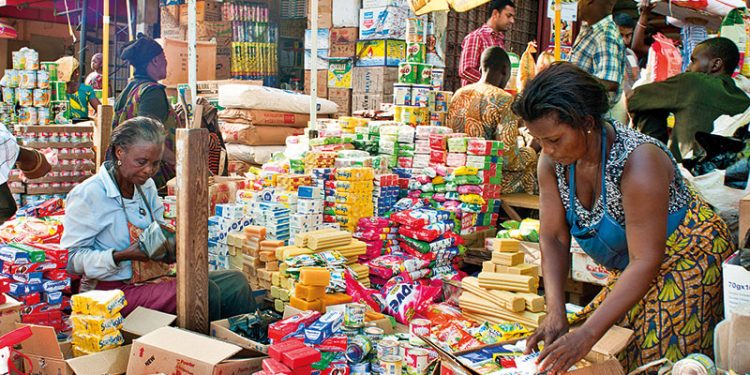
Ghana has been ranked 4th in the world in the 2019 Global Retail Development Index which studies the global retailing landscape.
China has assumed the 1st position, India has dropped to the 2nd position while Malaysia maintains the 3rd positions in the bi-annual study.
In Africa, Ghana is ranked 1st and has been described as Africa’s new “bright spot” driven by increased foreign & public investment as well as urbanization of the population.
Senegal ranks 7th; Morocco, 12th; Tunisia, 25th; Egypt comes 26th, Tanzania and Nigeria at 28th and 30th respectively.
Ghana’s retail sector, according to the study, is valued currently at $24.4 billion and is expected to reach $33.16 billion by 2024.
The report also revealed that department stores and shopping store space is set to grow by 15 per cent per year and many international retailers are taking notice.
As one of the most stable nations in sub-Saharan Africa, Ghana presents both retail opportunities and cautionary flags.
Ghana’s economy is expected to grow by nearly 8.8 per cent in 2019, backed by a thriving oil and gas sector makes it the fastest growing economy in the world this year,
The country increased foreign and public investment by 14.2 per cent (of GDP) in 2018, a number expected to rise to 30.8 per cent by 2028.
Moreover, the government announced 10 measures this year to support a range of other improvements, from online tax filing to automated delivery of electricity.
It has also been identified that urbanization will be a major driver for modern retailing, which is expected to reach $33.16 billion by 2024.
Online retailers reshape markets quite differently from country to country
Informal retailing dominates now, but the landscape is changing.
An abundance of small neighbourhood shops offering low-income consumers value-for-money goods still dominate the highly fragmented retail market.
In Ghana, retailing in small stalls in open markets still dominates, although independent small grocers are also popular.
Space in department and variety stores is targeted to grow by 15 per cent through 2023.
More international retailers view Ghana as the next go-to-market.
Sporting goods retailer Decathlon opened a store in Ghana in 2017 which is its largest in West Africa and hopes to expand with 50 more stores across the country.
The bi-annual study of the global retailing landscape also revealed that South African retailers Pick‘nPay and Massmart Holdings are expanding into African retail markets, particularly Ghana.
The International supermarket chain Pick & Pay plans to open a store this year, and Massmart has opened three outlets since 2017.
There are new shopping malls, primarily in big cities such as Sekondi-Takoradi, Accra and Kumasi.
While just 38 per cent of Ghanaians have Internet access, most are from the middle class, so e-commerce opportunities exist.
In April 2019, DHL launched DHL Africa eShop, an app that brings 200-plus US and UK online retailers to shoppers in 11 African countries, including Ghana.
Overall, the country may have a relatively low average income, but it is expected to be the fastest-growing economy in the world this year.
Other external contribution and impacts
Geopolitical instability and the growing power of local and regional competition in emerging markets are forcing global retailers to continually rethink their strategies.
While social media and e-commerce fuel the evolution of global consumers, national, regional and local realities, such as internet connectivity and the availability and cost of labour, continue to shape retail development globally.
So while technology, international investment, and regulatory reform continue to create a global market populated by a new kind of consumer, local market conditions, taxation structures, trade barriers, labour availability, and a host of other factors mitigate against globalization.
Retailers, consumer goods manufacturers, and international service providers rely on the GRDI as the definitive source for understanding which economies are growing, stagnant or declining, and why.
Africa has shown considerable growth and improvement, with seven African countries now ranked in top 30 in the Index.
Apart from Ghana, which is now ranked in 4th place for the first time on the index, other notable countries include; Senegal, Morocco, Tunisia, Egypt, Tanzania and Nigeria.
Egypt (debut on A.T. Kearney’s GRDI) has seen retail sector growth of 25 per cent between 2017 and 2018 on the back of economic and fiscal reforms.
It is “open” for business as many regional and international retailers are aggressively entering the market and transforming the landscape from traditional to modern trade.
About A.T. Kearney’s Global Retail Development Index (GRDI)
The Kearney Global Retail Development Index (GRDI) reveals that economic development and trade policy remain the largest factors in shaping retail growth in consumer markets.
The 2019 GRDI ranks 30 developing countries on a scale of zero to 100 selected from a list of 200 nations based on three criteria: achieving a “Country Risk” score above 35; having a population of at least five million and enjoying a per capita GDP of more than $3,000.
It looks at market attractiveness, retail sales per capita, business risk, number of large cities, business efficiency, country risk and market saturation.
A key theme in this year’s findings is the “Arrival of the Middle East and Africa”.
Ten of the top 30 countries fall into this bucket, suggesting that emerging economies are maturing, and the next wave of retail development and growth will certainly be in the broader region.
Driven by government-led economic reforms, a large and digitally connected youth consumer segment, and growing purchasing power, economies in the region have made significant gains in our rankings and have caught the attention of leading retailers.
In addition to local retailers investing in-country, many regional and international retailers are investing in both brick-and-mortar and digital across these markets.
Source: www.cnbcafrica.com

